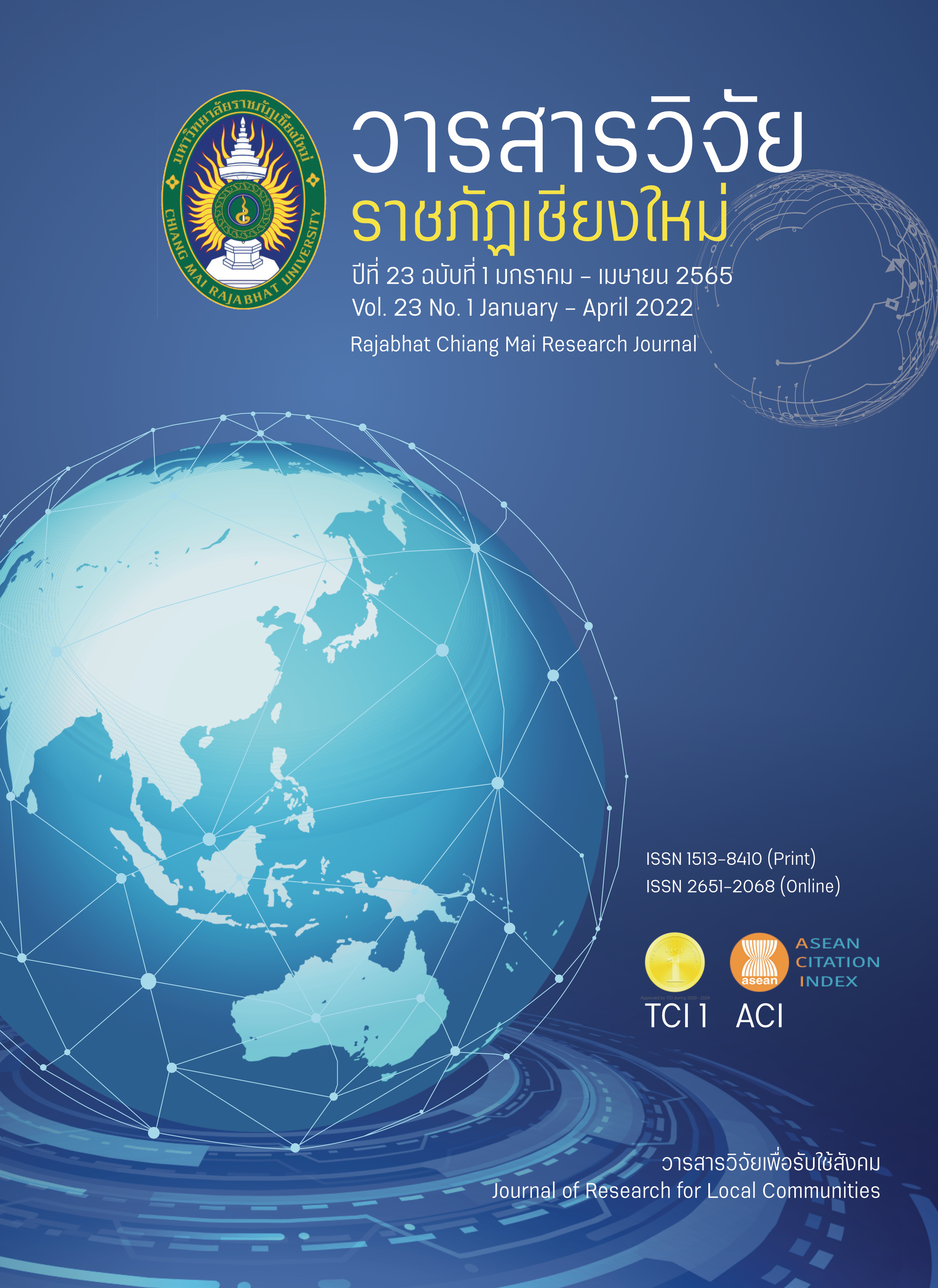การพัฒนาสื่อการเรียนรู้ “ชุมชนของเรา” เพื่อพัฒนาทักษะภาษาอังกฤษเพื่อการสื่อสารของนักเรียนระดับประถมศึกษา ชุมชนป่าตุ้มดอน อำเภอพร้าว จังหวัดเชียงใหม่
DOI:
https://doi.org/10.14456/rcmrj.2022.258695คำสำคัญ:
การพัฒนาทักษะภาษาอังกฤษ, สื่อการเรียนรู้, ชุมชนป่าตุ้มดอนบทคัดย่อ
การวิจัยเรื่อง “การพัฒนาสื่อการเรียนรู้ ‘ชุมชนของเรา’ เพื่อพัฒนาทักษะภาษาอังกฤษเพื่อการสื่อสารของนักเรียนระดับประถมศึกษา ชุมชนป่าตุ้มดอน อำเภอพร้าว จังหวัดเชียงใหม่” มีวัตถุประสงค์เพื่อสร้างและพัฒนาสื่อการเรียนรู้ “ชุมชนของเรา” ศึกษาคุณภาพสื่อการเรียนรู้ “ชุมชนของเรา” และผลสัมฤทธิ์ในการพัฒนาทักษะภาษาอังกฤษเพื่อการสื่อสารของนักเรียนชั้นประถมศึกษา ชุมชนป่าตุ้มดอน ตลอดจนความพึงพอใจต่อสื่อการเรียนรู้ “ชุมชนของเรา” กลุ่มตัวอย่างที่ใช้ในการวิจัยประกอบด้วย นักเรียนชั้นประถมศึกษาปีที่ 4-6 โรงเรียนบ้านป่าตุ้ม อำเภอพร้าว จังหวัดเชียงใหม่ จำนวน 40 คน คณะครูโรงเรียนบ้านป่าตุ้ม จำนวน 9 คน และผู้เชี่ยวชาญด้านภาษาอังกฤษ ด้านการจัดทำสื่อ ด้านการวัดผล และด้านกิจกรรมนันทนาการ จำนวน 5 คน เป็นการเลือกกลุ่มตัวอย่างแบบเจาะจง (purposive sampling) ซึ่งมีเครื่องมือที่ใช้ในการวิจัย ประกอบด้วย แบบทดสอบความรู้ (ก่อนเรียน – หลังเรียน) แบบประเมินคุณภาพชุดสื่อการเรียนรู้ และแบบประเมินผลความพึงพอใจ ต่อชุดสื่อการเรียนรู้ โดยทำการวิเคราะห์ข้อมูลทางสถิติ ด้วยค่าเฉลี่ยส่วนเบี่ยงเบนมาตรฐาน ค่าการแจกแจงแบบที (T- test) ค่าชั้นแห่งความเป็นอิสระ (df) ค่านัยสำคัญทางสถิติ และการวิเคราะห์เนื้อหา (content analysis)
ผลการวิจัย พบว่า 1) การพัฒนาชุดสื่อการเรียนรู้ “ชุมชนของเรา” เพื่อพัฒนาทักษะภาษาอังกฤษเพื่อการสื่อสารของเยาวชนชุมชนป่าตุ้มดอน ตำบลป่าตุ้ม อำเภอพร้าว จังหวัดเชียงใหม่ ประกอบด้วย 3 ขั้นตอน ได้แก่ การจัดทำ (ร่าง) ชุดสื่อการเรียนรู้ การหาประสิทธิภาพของชุดสื่อการเรียนรู้ การหาประสิทธิภาพแบบรายบุคคล 2) คุณภาพสื่อการเรียนรู้ “ชุมชนของเรา” มีคุณภาพโดยรวมในระดับดี (X̅ = 4.37) 3) ผลสัมฤทธิ์ทางการเรียนภาษาอังกฤษของนักเรียนด้วยสื่อการเรียนรู้ “ชุมชนของเรา” จากการเปรียบเทียบผลสัมฤทธิ์หลังการเรียนสูงกว่าก่อนเรียนอย่างมีนัยสำคัญทางสถิติที่ระดับ .05 และ 4) ความพึงพอใจต่อชุดสื่อการเรียนรู้ “ชุมชนของเรา” โดยภาพรวมอยู่ในระดับมาก (X̅ = 4.37)
Downloads
เอกสารอ้างอิง
Ban Patumdon. (2018). Ban Patumdon Community Plan. n.p. (In Thai)
Chaiwong, S. (2010). Use of Suggestopedia and Role Play Activity to Enhance English Listening and Speaking for Communication and to Decrease Anxiety of Students in Young Tourist Guides Club. (Master degree, Chiang Mai University). (In Thai)
Intakaew, S. (2014). Using Team Game Tournament To Promote English Grammatical Knowledge, English Speaking Ability And Social Skills Among Mathayom Suksa 1 Students. (Master degree, Chiang Mai Rajabhat University). (In Thai)
Jumchom, D., Bowchamchoy, K., & Kanthong, S. (2016). The Enhancement of Learning Achievement of Students on Thinking Skills of Thinking Skills Module (11-024-112) Employing the Active Learning Method, 1st Semester of Academic Year 2015. Princess of Narathiwas University Journal of Humanities and Social Sciences, 3(2), 47-57. (In Thai)
Juntarux, S. (2017). The Development of Electronic Book (E-book) on Health Promotion, Physical Fitness and Disease prevention for Grade 5 Students. (Bachelor’s degree, Dhonburi Rajabhat University). (In Thai)
Malithong, K. (2000). Educational technology and innovation. Bangkok: Arun Printing. (In Thai)
Ministry of Education. (2008). Basic Education Core Curriculum 2008. Bangkok: Agricultural Cooperative Association of Thailand Printing. (In Thai)
Nakkaew, A. (2014). A Study of Relationship Between Educational Administration by Brahmavihara Dhamma and Satisfaction of Municipal Teachers in Angthong Province. (Master degree, Phranakhon Si Ayutthaya Rajabhat University). (In Thai)
Nakprom, N. et al. (2017). The Development of Learning Packages for Improving English Reading Skill Regarding the Activity of Moderate Class, More Knowledge. Phetchabun Rajabhat University. (In Thai)
Nuansuwan, C. (2020). The importance of media in the teaching and learning process. Retrieved from http://kb.mcu.ac.th (In Thai)
Office of the Basic Education Commission. (2008). Foreign language learning subject group according to the core curriculum of basic education. Bangkok: Agricultural Cooperative Association of Thailand Printing. (In Thai)
Patarapong-olan, J. (2017). Improving English Speaking Skills in Daily Life by using a set of practice sets to develop English-speaking skills through public publications of 1st year vocational certificate students. (Attawit Commercial Technology College). (In Thai)
Patum Sub-District municipality. (2019). Local development Plan (2018 – 2022). (E-Book). Retrieved from www.patum.go.th (In Thai)
Plailek, W. (2020). The Development of Instructional Model Based on Active Learning to Enhance Process Skills and Mathematical Mind for Primary Students. (Ph.D., Silpakorn University). (In Thai)
Prompasit, P. (2016). Active Learning (AL) for at KPRU manual. (E-Book). Retrieved from www.huso.kpru.ac.th (In Thai)
Promwong, C. (2015). Teaching media system. Bangkok: Chulalongkorn University Printery. (In Thai)
Wattanarangsri, S. (2013). Instruction of supplementary text book for development learning achievement and analytical thinking ability of mathayomsuksa III students. (Bachelor’s degree, Rambhai Barni Rajabhat University). (In Thai)
ดาวน์โหลด
เผยแพร่แล้ว
รูปแบบการอ้างอิง
ฉบับ
ประเภทบทความ
สัญญาอนุญาต
ลิขสิทธิ์ (c) 2022 วารสารวิจัยราชภัฏเชียงใหม่

อนุญาตภายใต้เงื่อนไข Creative Commons Attribution-NonCommercial-NoDerivatives 4.0 International License.
1. บทความ ข้อมูล เนื้อหา รูปภาพ ฯลฯ ที่ได้รับการตีพิมพ์ใน “Community and Social Development Journal” ถือเป็นลิขสิทธิ์ของ Community and Social Development Journal มหาวิทยาลัยราชภัฏเชียงใหม่ และเพื่อให้เผยแพร่บทความได้อย่างเหมาะสมผ่านสื่อสิ่งพิมพ์และอิเล็กทรอนิกส์ ผู้เขียนยังคงถือครองลิขสิทธิ์บทความที่ตีพิมพ์ภายใต้ใบอนุญาต Creative Commons Attribution (CC BY) ซึ่งอนุญาตให้เผยแพร่บทความซ้ำในแหล่งอื่นได้ โดยอ้างอิงต้องอ้งอิงบทความในวารสาร ผู้เขียนต้องรับผิดชอบในการขออนุญาตผลิตซ้ำเนื้อหาที่มีลิขสิทธิ์จากแหล่งอื่น
2. เนื้อหาบทความที่ปรากฏในวารสารเป็นความรับผิดชอบของผู้เขียนบทความโดยตรง ซึ่งกองบรรณาธิการวารสารไม่จำเป็นต้องเห็นด้วยหรือร่วมรับผิดชอบใดๆ














